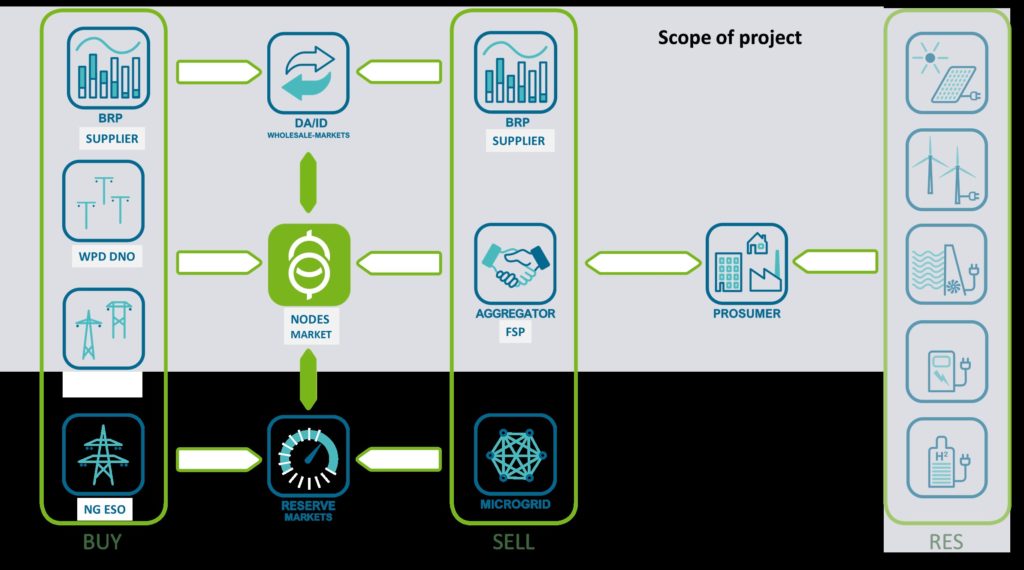An ongoing power flexibility trial we’re leading is demonstrating that flexibility can be bought and sold in a continuous short-term market. Over the past two months more than 50MW of flexibility services has been procured across 241 trades on Nodes ShortFlex market. The trial aims to bring new routes to market for flexibility providers, allowing new assets to participate.
The findings follow the conclusion of Phase 1 of the IntraFlex project – a collaboration trial between WPD, Nodes and Smart Grid Consultancy. The project aims to look at the impact calling on flexibility services has on suppliers and develop real-time markets where providers can signal their availability on the day. It also aims to ensure that the inevitable expansion of the flexibility markets doesn’t distort the wider market and negatively affect suppliers and, ultimately, customers.

Throughout the trial, the variability in how participants could capitalise on the service was evident. With adding our requirements on Mondays and Fridays, participants responded by making offers on the Nodes platform. Some bids were matched within 10 minutes of being uploaded, while others were matched less than two hours ahead of the required delivery period.
The trial has also shown differences in behaviours based on the technology types used to provide flexibility: for example, peaking gas generators behaved differently to domestic scale providers. In these early stages bids have generally been driven by volume and timing requirements rather than price. However, feedback has indicated that this is likely to change as processes mature and volumes increase.
WPD’s Matt Watson, who is managing the IntraFlex project, said, “Following the success of Phase 1 of the trial, we are delighted to confirm that we will be continuing into Phase 2 in spring 2021. This will focus on increasing the flexibility volumes on the platform as well as tweaking the platform and the surrounding processes to make them more scalable and easier to roll out.
“The use of a continuously clearing marketplace presents a number of new opportunities in terms of how we procure services. The work in Phase 1 has shown it can be done, helped us build our understanding and has highlighted a number of ways forward. We are excited to start building to Phase 2 where we can trial options that become more viable with scale.”
Sofia Eng, project manager at Nodes, commented, “Working to develop and implement a closer to real time continuous market with WPD, Smart Grid Consultancy and the participating flexibility service providers has been extremely rewarding. At Nodes, we aim to build a market place where different types of flexibility can compete on a level playing field and where DNOs like WPD can buy flexibility when it is needed, where it is needed and at a fair price.
“The IntraFlex project has allowed us to take a big step forward in achieving that goal, as we have seen, for the first time, flexibility being bought, sold and settled between the DNO and flexibility providers in a closer to real-time continuous market place. We look forward to continuing this work with all of the stakeholders involved in the project as part of Phase 2 and we would encourage others who are interested in knowing more to get in contact and get involved in the next phase.”
Conor Maher-McWilliams, Kaluza’s head of flexibility, said, “Creating a decentralised and decarbonised energy system full of flexible, low carbon technologies will only work if we can coordinate charging at scale to support network balancing. IntraFlex has enabled Kaluza’s domestic flex technology to optimise charging across a wide range of smart devices in real time. Working with Nodes and WPD, we have been able to demonstrate a fully automated, API driven, machine-to-machine service delivery using electric vehicle smart chargers, V2G charge points, and home batteries for the first time in the UK. This collaborative achievement provides the template for how to ramp up flexibility services to millions of in home devices over the next decade.”
William Goldsmith, Head of Commercial & Grid Services at ev.energy, added: “WPD have been great to work with during the IntraFlex project, showing a keen interest in participant feedback and a pragmatic approach to implementing this to make continual improvements throughout the trial. ev.energy found Nodes flexibility market to be a simple and effective tool for providing energy networks with valuable flexibility from smart electric vehicle charging, enabling a UK first for this type of close to real-time flexibility procurement. We look forward to the roll out of Phase 2 in the spring!”
Recruitment for Phase 2 will start in earnest in the New Year, however if you are interested in taking part please contact member.services@nodesmarket.com. The trial is open to assets that can reduce demand, or increase generation at peak times and can be contracted directly or via aggregators, suppliers or other third parties.



